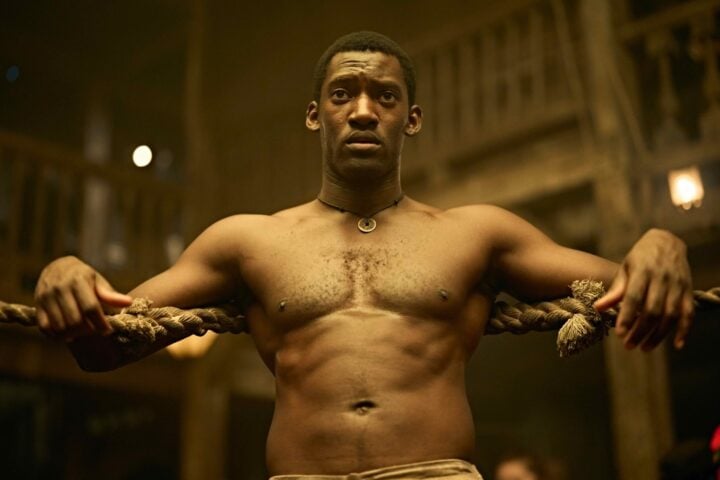The opening title cards of Karim Aïnouz’s Firebrand state that history is written primarily about men and war, while “for the rest of humanity, we must draw our own—often wild—conclusions.” For audiences, it’s a warning of the revisionism to come in this story of Katherine Parr (Alicia Vikander), the sixth and last wife of King Henry VIII (Jude Law).
It is, though, not a promise of a compelling or invigorating story. That’s because the filmmakers, as intent as they were to play fast and loose in the sandbox of history, hardly explore the motives and emotions that drive Katherine as she balances her fealty to her husband and her friend Anne Askew (Erin Doherty), the famed poet who fought for the cause of English Reformation.
Instead, what follows is an often shapeless and rudderless film, focused mainly on whether or not King Henry trusts Katherine. (Spoiler alert for those who don’t know their history: She defied the odds by outliving her husband.) In her first of two brief meetings with Anne, Katherine says that she believes she was chosen by God to influence the king, while in the second, she gives Anne an expensive necklace that was gifted to her by Henry so that Anne may sell it and flee the area to escape the impending persecution of all reformers.
These meetings hint at Katherine’s passion for England to break away from the Catholic Church and allow bibles to be published in English so that the masses may read and interpret them for themselves. Yet, despite its title, Firebrand captures little of her supposed fervor or fortitude.
Some 20 minutes into the film, Henry returns from a trip abroad and we’re offered a slight sense of how Katherine uses her feminine guile to mitigate this two-faced, domineering beast of a man’s bloviating self-importance and violent outbursts. But she never comes close to blossoming into the feminist icon that Firebrand purports her to be.
Throughout the film, Katherine is almost solely reactive to Henry, and her quiet resilience is given no significance outside of it being a survival tactic in an abusive relationship. Meanwhile, with Law leaning fully into the grossness of Henry, the king remains nothing more than a drunken boar—a gregarious hedonist who gives into every temptation.
In the final act, Katherine regains some of her agency as she navigates her survival against charges of heresy and ensures that Henry’s daughter ascends to the throne after his death. But even her final victory feels somewhat insignificant, or at least underwhelming, as we’re given no idea as to why the latter cause was important to her. For all the talk of Katherine’s heretical behavior, we’re witness to hardly any of it, and as such she’s ironically far less of a firebrand than Anne, who, in less than 10 minutes of screen time, is rendered more spiritually, emotionally, and politically complex than the woman the film is about.
Ultimately, in trying to make Katherine both a historical girlboss and a near-martyr to a vaguely articulated cause, Firebrand’s meandering, under-baked screenplay manages to neither have its cake nor eat it too. In the end, it simply paints a muddled portrait of a woman often overlooked in English history without clearly asserting why she shouldn’t be in the first place.
Since 2001, we've brought you uncompromising, candid takes on the world of film, music, television, video games, theater, and more. Independently owned and operated publications like Slant have been hit hard in recent years, but we’re committed to keeping our content free and accessible—meaning no paywalls or fees.
If you like what we do, please consider subscribing to our Patreon or making a donation.





